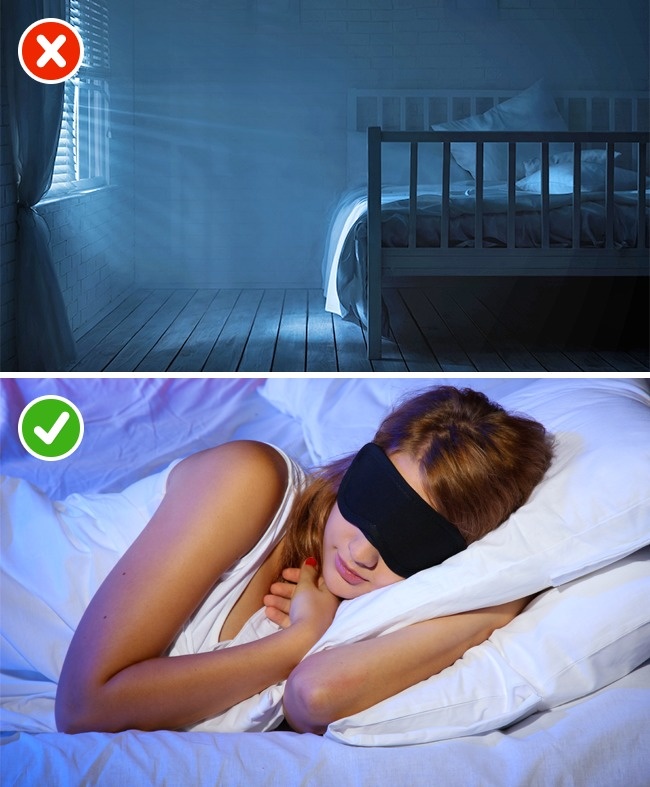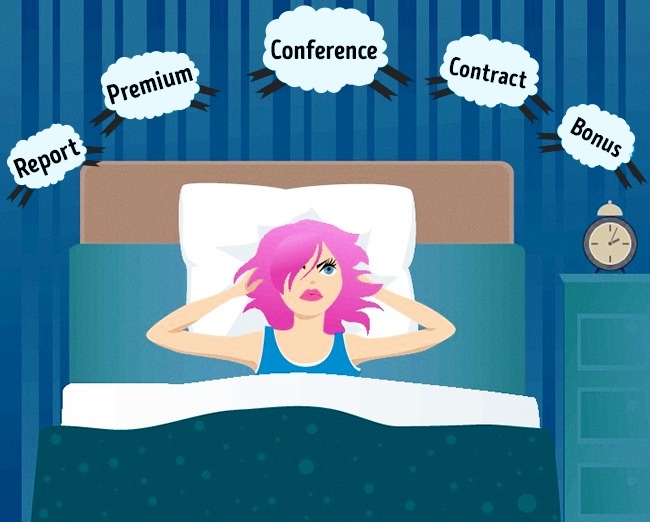Share this @internewscast.com
Struggling with sleepless nights can be a frustrating and exhausting experience. In today’s fast-paced world, many factors contribute to insomnia and poor sleep quality, affecting not only your energy but also your health and productivity. In this comprehensive guide, we explore 12 surprising reasons why you can’t sleep at night, backed by expert research and actionable strategies. Whether you’re battling stress, an unsuitable sleep environment, or lifestyle habits, this article offers insights and solutions to help you reclaim a peaceful night’s sleep.
Why can’t I sleep well?
The Air Temperature Is Incorrect: Optimize Your Bedroom Climate

A consistent bedroom temperature plays a crucial role in regulating your sleep cycle. When your room is too hot or too cold, your body struggles to maintain the optimal core temperature required for deep sleep.
Key Points:
Ideal Temperature: Experts suggest maintaining a temperature between 60°F and 67°F (15°C and 19°C) for optimal sleep.
Air Quality: Proper ventilation and air filtration also contribute to a healthier sleep environment.
Research from the Sleep Foundation highlights that controlling ambient temperature is among the most effective ways to improve sleep quality. Consider investing in a smart thermostat that adjusts room temperature automatically during the night for uninterrupted sleep.
Physical Exercise: Balancing Activity for Better Sleep

Regular physical exercise is one of the most effective natural remedies for insomnia. However, the timing and intensity of your workouts can greatly impact your ability to fall asleep.
Key Points:
Exercise Timing: Exercising too close to bedtime can increase adrenaline and body temperature, making it difficult to wind down.
Type of Exercise: Opt for moderate activities like yoga or walking in the evening rather than intense cardio sessions.
A study published on Healthline suggests that engaging in light to moderate physical activity earlier in the day can help regulate your circadian rhythm, leading to improved sleep quality and overall health.
Lack of Time: The Impact of a Busy Lifestyle on Sleep

Modern life often leaves little time for winding down, contributing significantly to sleep problems. A hectic schedule can lead to a chronic sleep deficit, reducing your ability to fall and stay asleep.
Key Points:
Time Management: Establishing a strict sleep schedule can help signal your body that it’s time to rest.
Digital Detox: Reducing screen time before bed can lower stress levels and prepare your mind for sleep.
Experts from WebMD emphasize that a consistent bedtime routine, free from work or screen distractions, is essential in promoting better sleep and reducing anxiety.
Lighting: The Role of Light Exposure in Sleep Quality

Exposure to the wrong type or amount of light, particularly blue light from electronic devices, can interfere with the natural production of melatonin, the hormone that regulates sleep.
Key Points:
Natural vs. Artificial Light: Exposure to natural light during the day is beneficial, but artificial lighting in the evening can disrupt your sleep cycle.
Sleep-Friendly Lighting: Use dim, warm lighting in the evening to prepare your body for rest.
According to research on Harvard Health, minimizing blue light exposure by using screen filters or turning off devices an hour before bed can significantly improve your sleep quality.
Noise: Minimizing Disruptive Sounds for Uninterrupted Sleep

Noise pollution can be a significant barrier to achieving deep, restful sleep. Even low-level sounds can cause micro-awakenings, which diminish sleep quality over time.
Key Points:
Soundproofing: Investing in soundproofing measures or using white noise machines can help mask disruptive sounds.
Nature Sounds: Listening to calming nature sounds or soft ambient music can enhance your sleep environment.
The National Sleep Foundation notes that reducing noise disturbances by creating a quiet sleep environment can greatly enhance the restorative phases of your sleep cycle.
Using Your Bed For The Wrong Purpose: Redefining Sleep Spaces

Your bed should be reserved exclusively for sleep and relaxation. Using it for work, television, or even eating can associate your bed with wakefulness rather than rest.
Key Points:
Sleep Association: Train your brain to associate your bed only with sleep by keeping work and electronic devices out of the bedroom.
Bedroom Environment: Create a dedicated sleep sanctuary that encourages relaxation.
A report from Psychology Today underscores that establishing clear boundaries between work and sleep areas is critical for breaking the cycle of insomnia and promoting a healthier sleep routine.
Caffeine: The Hidden Culprit in Sleepless Nights

Caffeine is a well-known stimulant that can interfere with your ability to fall asleep, even if consumed several hours before bedtime.
Key Points:
Consumption Timing: Limit caffeine intake to the morning hours and avoid caffeinated beverages in the afternoon and evening.
Sources of Caffeine: Beyond coffee, consider tea, chocolate, and certain medications that contain caffeine.
According to Mayo Clinic, managing caffeine intake by tracking your consumption and opting for decaffeinated versions can help in reducing its negative effects on sleep.
Making Yourself Fall Asleep: Techniques to Encourage Sleep

Sometimes, sleep doesn’t come naturally, and forcing yourself to sleep can increase anxiety and delay the process. Instead, consider techniques that encourage your body to relax naturally.
Key Points:
Relaxation Techniques: Practice deep breathing, progressive muscle relaxation, or meditation to calm your mind.
Sleep Rituals: Establish a calming pre-sleep routine that might include reading, gentle stretching, or listening to soothing music.
Insights from Calm and Headspace reveal that mindfulness and relaxation practices are highly effective in reducing sleep onset latency and promoting deeper sleep.
Alcohol: Understanding the Impact on Sleep Quality

Although alcohol might help you fall asleep initially, it can significantly disrupt your sleep cycle, reducing the quality of your sleep.
Key Points:
Sleep Cycle Interference: Alcohol can alter your sleep architecture, leading to less restorative sleep.
Moderation: If you choose to drink, limit your intake and avoid alcohol close to bedtime.
Research available on Medical News Today indicates that while alcohol may promote sleep onset, its metabolism during the night leads to fragmented sleep patterns and decreased REM sleep.
Mind Overload: Managing Stress and Anxiety

A racing mind filled with worry and stress can be one of the biggest obstacles to falling asleep. Cognitive overload often prevents the brain from switching into sleep mode.
Key Points:
Stress Management: Incorporate stress-relief techniques such as journaling, therapy, or mindfulness exercises into your daily routine.
Cognitive Behavioral Therapy (CBT): CBT for insomnia is a proven method to reframe negative thought patterns that contribute to sleeplessness.
According to The American Academy of Sleep Medicine, addressing underlying anxiety and stress through structured therapy and relaxation methods can significantly improve your sleep quality.
Absence of Habit: The Importance of a Consistent Sleep Routine

A lack of consistent sleep habits can throw off your body’s internal clock, leading to difficulties in falling asleep and waking up.
Key Points:
Regular Schedule: Aim to go to bed and wake up at the same time every day, even on weekends.
Sleep Environment Consistency: Create a bedtime ritual that signals to your body that it’s time to sleep.
Research highlighted by Sleep.org shows that maintaining a regular sleep-wake cycle is essential for syncing your circadian rhythm, which can improve overall sleep quality and daytime performance.
Sleeping Position: How Your Posture Affects Sleep
The position in which you sleep can have a significant impact on your comfort and the quality of your sleep. An improper sleeping position may lead to discomfort, pain, or even disrupted breathing patterns.
Key Points:
Optimal Positions: The side-sleeping position is often recommended to reduce snoring and promote spinal alignment.
Ergonomic Pillows and Mattresses: Investing in quality bedding that supports your preferred sleeping position can relieve pressure points and improve sleep quality.
Insights from WebMD emphasize that small adjustments in your sleeping position, along with ergonomic bedding, can make a significant difference in reducing discomfort and promoting deeper sleep.
Conclusion
Improving your sleep quality starts with understanding the various factors that might be sabotaging your nightly rest. From controlling your bedroom temperature and optimizing your lighting to managing caffeine intake and stress levels, each element plays a critical role in ensuring that you get the restorative sleep you deserve. By implementing these expert-backed strategies and focusing on creating a sleep-friendly environment, you can overcome insomnia and boost your overall well-being.
Embrace the journey to better sleep by experimenting with these tips and gradually building a consistent sleep routine. Remember that changes may take time, and what works for one person might need slight adjustments for another. If you continue to experience persistent sleep issues, it might be worth consulting a sleep specialist or healthcare provider.
For more detailed insights on sleep improvement and strategies to manage insomnia, consider exploring resources from Sleep Foundation, Healthline, and National Sleep Foundation. These external sources offer extensive research, expert opinions, and additional tips that can further assist you in your quest for better sleep.
By understanding and addressing these 12 surprising reasons why you can’t sleep at night, you empower yourself to take control of your sleep health. With the right adjustments in your environment, lifestyle, and habits, a rejuvenating night’s sleep is within reach. Optimize your routine today for a more energetic tomorrow and enjoy the benefits of quality sleep, from enhanced productivity and improved mood to better overall health.
In conclusion, every element from air temperature to your sleeping position can be optimized to create a sanctuary of rest. Focus on establishing a balanced lifestyle with proper exercise, time management, and mindfulness practices. As you implement these changes, monitor your progress and adjust your strategies for long-term sleep improvement. Embrace the journey to restful nights and discover the profound impact that quality sleep can have on every aspect of your life.
Sleep is not just a nightly necessity but a cornerstone of health that influences your performance, mood, and overall quality of life. By addressing these 12 key areas, you are taking proactive steps toward a better, healthier future—one sleep cycle at a time.
















